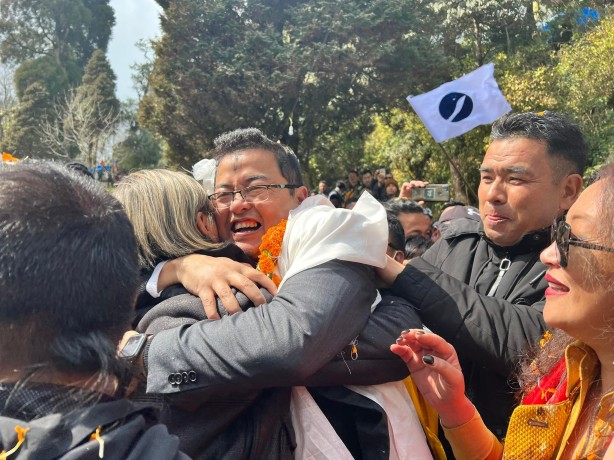
Darjeeling’s civic poll results have surprised the political pundits. The newbie political entrant Hamro Party (Our Party), a three month old local party won 18 of 32 seats in the Darjeeling Municipality. Results of the civic polls in Darjeeling were announced on 2 March 2022 at the Darjeeling Government College. Hamro Party is now all set to form the board of commissioners and take over the administration of the Darjeeling Municipality.
Anit Thapa’s Bharatiya Gorkha Prajatantrik Morcha (BGPM) came second in the race winning nine seats followed by TMC who won two and Bimal Gurung’s Gorkha Janmukti Morch (GJM) won three seats in Darjeeling’s civic body. The GNLF-BJP alliance that had been victorious in the last Bengal Assembly elections failed to capture even one ward this time in Darjeeling.
Interestingly, Ajoy Edwards president of the winning Hamro Party and probable candidate to be the Darjeeling Municipality Chairman lost in his own ward by five votes. However, in an interview later Edwards said that “The chair was never the goal, the message was. To that reason, I also accept my defeat in Ward 22 with humility.” He further said, “I learned many things about Darjeeling during this campaign— I’m more convinced than ever that we’re a good and decent people, that democracy matters and that what our hills have always stood for is worth fighting for.”
Ajoy Edwards further explained that though the state government cannot be taken as an “enemy” as the Darjeeling Municipality comes under the purview of the Bengal Municipal Act, however, the citizens of Darjeeling will now no longer be puppets in the hands of anyone and it will now be an “era of diplomacy, diplomacy and diplomacy”. He spelt out some of their short term development projects like ‘garbage management’, opening of diagnostic centres, apart from solving the issues of water scarcity, traffic jam and bringing revenue back to the Darjeeling Municipality.
Ironically the Darjeeling municipality in the 1970s was known to be one of the richest municipalities in the state. Over the years it has been deprived of funds from the state government and also whatever little comes is inept to deal with day to day civic problems. The party won the hearts of the citizens of Darjeeling and they are now ready for a new beginning in the hills.
Soon after the results were announced chief minister Mamata Banerjee announced that she “welcomes the Darjeeling civic election results” and said that the state is interested in conducting the Gorkhaland Territorial Administration elections soon and the Panchayat elections too. The last Panchayat elections were held in 2000 in the hills. The hills unlike the rest of Bengal have been given a two tier panchayat rule. Three-tier Panchayat system in Darjeeling district exists only in the Siliguri sub Division.
This region, which is North Bengal, Terai and the Doors areas, and it’s Nepali speaking community have been demanding a separate state of “Gorkhaland” outside the state of West Bengal but within the Indian ambit for a long time. The territory is one of the most juggled territories. Perhaps, it was the proximity of this region to Kolkata that after India’s independence the region was made a part of Bengal though “having no history with the state and later now became a district under it”.
The people thus have been part of the rise and fall of the demand for a separate state and this movement reached it’s peak in the 1980s and again in 2007. These movements have been a manifestation of relative deprivation of the people of the hills, lack of basic needs like water, poor health facilities, unemployment among the youth, degeneration of the tea gardens, absence of “need based policies”, unfulfilled assurances that were promised to the people of the hills. Most of the policies of the state government so far have been appeasement policies.
The question of identity of the Indian Nepalis and a political space for the legitimization of that identity is central to the Gorkhaland movement. Until and unless there is a resolution, or questions of the identity and rightful representation of indigenous hill population are not rightly addressed the agitation even though sporadic in nature will continue and the tranquility and harmony of the hills will be at stake for years to come.
